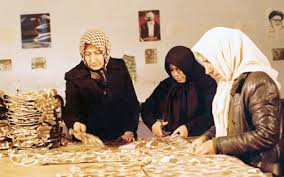A Woman Against the Prayer Imam
She Alone Stood Against the Prayer Leader [Imam]
September 17th, 2016

The “Malek-e-Ashtar” mosque contains a chestful of dazzling memories. The youth who attended prayers at the mosque began their activities right after the Revolution and continued for fifteen years. We’ll come to know more about them in following interviews. Our first interviewee was Mrs. Ashrafi who took the first steps to ask for change at the local mosque. She alone stood against the prayer leader [Imam] and the traditional elders in the mosque, speaking in favor of the Revolution, and of course suffered the consequences.
Interviewer: For my first question, I’d like to know how you started your activities in the mosque. were you active before the Revolution or did it all begin afterwards?
Ashrafi: I used to go to the mosque for prayer before the Revolution. Back in those days we called it the “Kheir-khah Mosque” because the mosque was endowed by a man named Mr. Kheirkhah. People who attended prayers there, weren’t supporters of the Revolution, particularly the Imam who used to pray for the Shah and his family after each prayer. I think I was the only one from our mosque to take part in the protests and demonstrations [for the revolution]. Back then I had an argument with them about having a library in the mosque.
Interviewer: Why an argument? What was wrong with a library?
Ashrafi: There was no problem but we didn’t speak the same language. They had a different perspective and expected the mosque to merely be a place for saying prayers and nothing more. My insistence made them slightly give in and they even decided to consider a location for the library, but the Revolution happened and everything was canceled. After the Revolution, I had greater expectations. It wasn’t just about a library. I protested against the Imam and the fact that he hadn’t changed a bit since the Revolution. I asked why he wouldn’t bring up the subject of the country’s current events.
Interviewer: How did other people react to your protest?
Ashrafi: As I already said, the people who came to our mosque weren’t revolutionary people and instead of supporting me, they sided with the Imam. But I wasn’t going to give up, I protested a lot and they kicked me out. They told me to never come back.
Interviewer: And did you do as they asked?
Ashrafi: I still went there for prayers. The only difference was that I didn’t protest anymore. A few days passed until I heard some men arguing with the Imam. They were young and their protest was the same as mine. So I started to back them up.
Interviewer: Did you know them before?
Ashrafi: No, I didn’t know them at all. But it was clear that they were aware of the atmosphere in our mosque, about what had happened before and how I was treated.
Interviewer: Did you try to know more about them later? Did you contact them?
Ashrafi: I don’t remember exactly what happened later but we made a good team in our mosque. we were all young. We had meetings and made decisions.
Interviewer: But you said the elderly in the mosque were opposing you?
Ashrafi: Yes, but I wasn’t alone anymore! Now we were a team and could call the shots. They were old and weren’t able to put up a fight.
Interviewer: After you formed a team, what activities did you start? What did you first do?
Ashrafi: We did a lot of things, but we first started by changing the name of our mosque. So we had a meeting and decided that Kheirkhah wasn’t a proper name and we needed a new name related to our Revolution. A lot of names were suggested but finally we all decided on “Malek-e-Ashtar”. So we changed the name, although others were against the change, but they couldn’t stop us. It was just the start. A lot of changes happened later. Forming a group of combatants, making a library, changing the Imam, forming theater and singing groups…
Interviewer: For how long did you continue to cooperate with that team?
Ashrafi: I remained active until I got married. I attended their meetings and made important decisions. But after my marriage I became less active and finally in 1980, we moved elsewhere.


